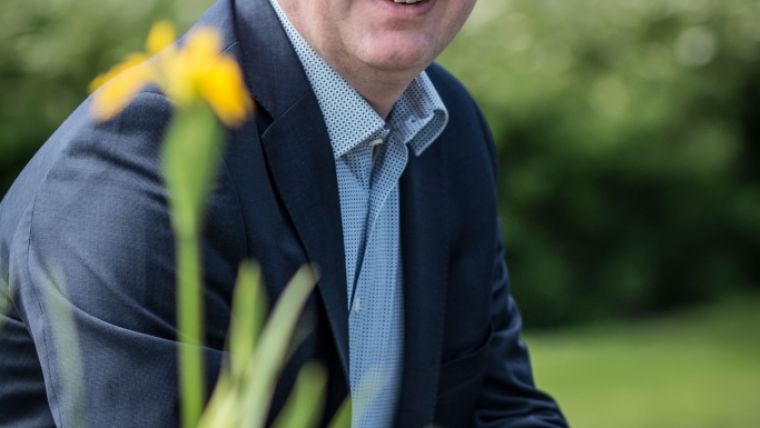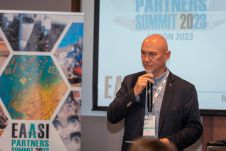Optimism about Land Rights for All
An International Department within a Cadastral Organisation is a Form of Maturity
The way in which land rights are registered in The Netherlands is internationally renowned. The relevant national agency, Kadaster, has extensive knowledge and skills regarding land registration, land consolidation and geographic information. Kadaster believes it has a social responsibility to apply its knowledge and skills in any country where they are needed. Registered rights give owners legal security, so sound land registration is an instrument for economic development and better living conditions. In this interview, 'GIM International' talks to Kees de Zeeuw, the enthusiastic manager of Kadaster International which handles the organisation’s international consultancy activities.
Kees, could you introduce Kadaster International to our readers?
Kadaster International is a part of the Cadastre, Land Registry and National Mapping Agency of the Netherlands, which is called Kadaster for short in Dutch. Our international team is focused on international advisory services, but we also contribute to international forums, conferences and partnerships in order to develop and share knowledge, expertise, networks and innovative ideas.
Do you operate worldwide?
Yes. Our policy is that we work in countries where our input contributes to the improvement of land rights for all. This means we can work almost anywhere, from developed to developing countries. Of course we are sometimes limited by safety issues, available funding or a mismatch with our organisation’s values. In general national governments are our logical partners, but in most cases we also cooperate with the private sector, non-governmental organisations and academia. In practice our main focus is on countries in Africa, Latin America, Asia and Europe. Typically, we work in about 20 different countries every year.
Do you work on a cost recovery basis or as a profit organisation?
We provide our services on a cost recovery basis. This means we charge consultancy fees for our work that match the level of expertise we provide, but we have no profit-related or minimum turnover targets. Our internal accountability is focused on impact, effectiveness and cost recovery. Because we always work for external customers and financing bodies, however, we also have to account for adhering to our terms of reference and budget constraints.
Do you work in cooperation with the Dutch Ministry of Foreign Affairs?
At this moment we do. Not only the ministry, but also the Dutch embassies worldwide are an important partner in our work. Especially the diplomatic expertise and support of our embassies has proven to be of great help in achieving our project goals in various countries.
Today, development partnerships are under pressure in many countries – is this also the case in your country?
I’m afraid that overall I have to answer this question with a ‘yes’. The Netherlands had a good history of allocating 0.7 percent of its gross domestic product to international cooperation, but over the last decade this has decreased quite steeply. However, looking at the governmental situation over the last four years, there has been a clear rise in interest in the topic of land tenure and land governance. This means that we have seen significant growth in development partnerships in our sector. However, it is uncertain whether this will continue in the years ahead. We had a general election in March of this year and four political parties are currently trying to form a new coalition government. What this will mean for development partnerships and the focus on land all depends on the new government to be formed.
(By Rohan Bennett and Wim van Wegen, GIM International)
Why has specific attention been paid to tenure security over the last few years?
I think there are various reasons, ranging from the personal political interest of our minister of foreign affairs to renewed insights into how to achieve good results in development partnerships. But I’m convinced that the Sustainable Development Goals (SDGs) as defined by the UN have played a very important role in creating awareness of the importance of land governance and land tenure for sustainable development. In many descriptions of the targets and indicators as used in the SDGs, land is mentioned as a key success factor. I see both developing and developed countries taking this up in their policies and activities.
The Sustainable Development Goals are ambitious in striving for security of tenure for all. Can this be achieved?
I think the most challenging part of the SDGs is the time frame. Although 2030 still sounds a long way off, we actually only have 13 years to go which is a short space of time in which to achieve land rights for all. After all, there are billions of parcels still to be mapped. But it can be done! Now, you might be wondering why I’m so optimistic about this. First of all, because I feel a sense of urgency wherever I go – from the peace negotiations in Colombia to the World Bank’s Land and Poverty Conference, and from the FIG Working Week in Helsinki to the national and local projects in Mozambique. Everywhere, the need for fit-for-purpose land administration is on the agenda and attempts are being made to achieve country-level implementations. Secondly, technology is on our side. Satellites, electronic devices, connectivity and mobility are helping us find new ways to do things. Not only are the possibilities increasing, but the cost of technology is also decreasing. Sure, we still need tomorrow’s innovations to further speed up the processes. But the pace of advancement increases exponentially and we have some very clever people in our field of work who will be able to translate the developments into a boost in registrations. And thirdly, because of the money aspect. Registering billions of parcels costs many billions of dollars, or euros, or whatever currency. But on a global scale, this isn’t much money at all. The money is there. As long as we are able to reduce the cost per parcel, it is achievable.
Don’t you see any restrictions?
The restrictions stem from the people, not the conditions. Corruption, inequity and disputes complicate the matter. The people must be willing to create an inclusive society and a shared sustainable development. The sustainability of the land tenure systems should also be anticipated. And let’s not forget the capacity and expertise necessary to make it all happen.
How do you support knowledge development?
The days when cadastral organisations were just data factories and information providers to society are almost behind us. Knowledge has become a cornerstone of our work. This means that we should invest not only in standards and systems, but also very much in people. Competences, shared values and expertise need attention – at all levels and in large numbers. In the projects we run around the world, we therefore embrace the fit-for-purpose approach which includes all three aspects: the geospatial framework, the legal framework and the institutional framework. Capacity building is an essential part of this mix. Knowledge development can be done in many ways, and training and higher education programmes are part of that. Our long-standing cooperation with ITC Enschede’s Land Administration faculty, part of the Technical University of Twente, is therefore important to us.
In terms of meeting your goals, what is the biggest single challenge for Kadaster International in the next 5 years?
The question is whether we can ignite initiatives that result in inclusive and sustainable land administration systems all over the world. We can’t do the hands-on work needed to map billions of parcels, set up thousands of sustainable IT systems and to reform governments into efficient citizen-oriented organisations based on good governance. But, hopefully, we can inspire others to rise to the challenge and to take things to the next level. Part of that challenge is to be prepared to make mistakes and to admit our failures and defeats. Most innovations and true changes are not achieved through a series of successes only.
Does the Kadaster organisation also learn from other countries and, if so, can you give us some examples?
Very much so! It is a specific objective of our international work to also learn from it ourselves. We must! We are a monopolistic organisation in our own country, so our inspiration should be found abroad. Developments around blockchain and bitcoins are a great example of that. Seeing other countries experimenting with these new possibilities inspired us at Kadaster to set up a working group to investigate the impact, opportunities and threats of blockchain technology for our own organisation.
What can other developed countries learn from your approach?
I think that having an international department within a cadastral organisation is a form of maturity. The exchange of ideas and knowledge is essential for organisations to contribute to the Sustainable Development Goals at the global level and to provide the best possible services to the citizens in your own country.
Do you have a message for our readers?
Be optimistic! There are several good reasons for optimism. The future for the profession is bright and promising. We can now do what the world has been asking of us for many decades, and it’s possible to share and use the data for many purposes. The more data that is produced, the more data that has to be maintained – either by professionals or by means of crowdsourcing. But the quality of crowdsourced data must be checked, so there’s work to be done! I firmly believe it is possible to achieve the ambitions of the Sustainable Development Goals.

Value staying current with geomatics?
Stay on the map with our expertly curated newsletters.
We provide educational insights, industry updates, and inspiring stories to help you learn, grow, and reach your full potential in your field. Don't miss out - subscribe today and ensure you're always informed, educated, and inspired.
Choose your newsletter(s)
























